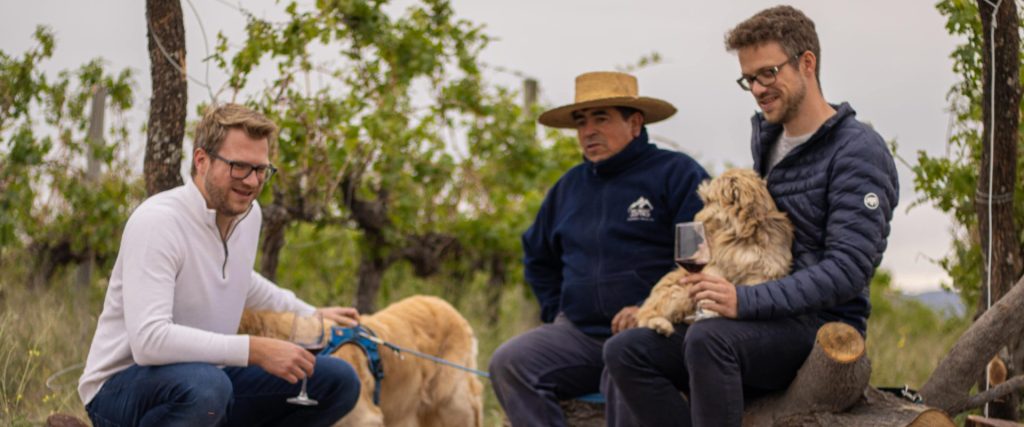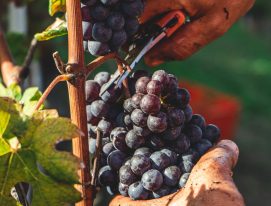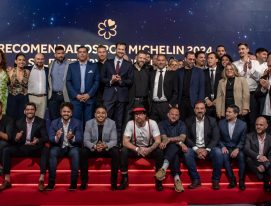The earth needs a trillion more trees, 15 billion are cut down every year and 46% of its forests have been destroyed. These scientific findings lie behind the initiative of the 3SAPAS winery founded by the Swiss winemakers Arnaud and Florian Frésard, and Gibbs (the family dog), who are accompanied by a new team made up of Jonás Lépine, Luis Coita Civit and Fernando Sota.
“Our slogan is ‘Turning Wine into Life’, representing the idea that every time you drink a bottle of 3SAPAS, you’ll be bringing a tree to life,” explains Arnaud in perfect Spanish. “Not just because respect and care for the environment are key principles for us but also because we believe that sharing a glass of wine with friends, one’s partner or family is also a way of life.”
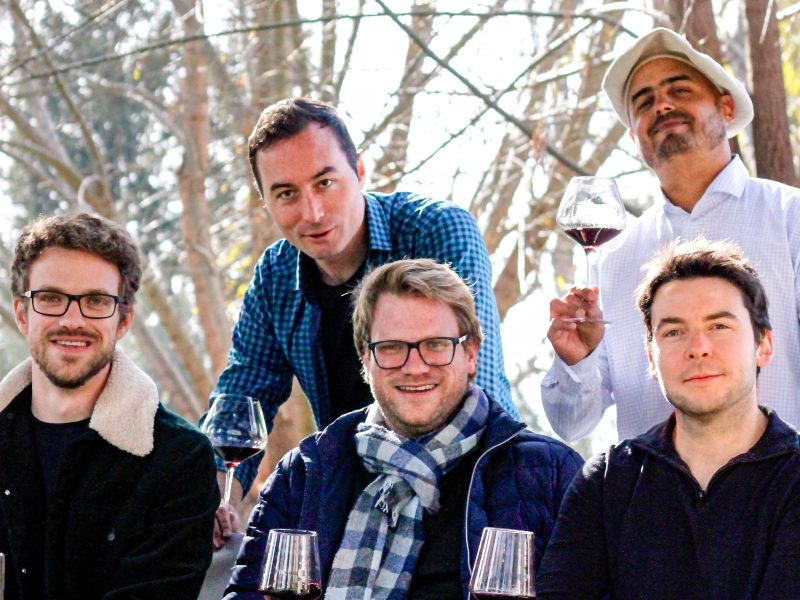
In addition to their environmental commitments, 3SAPAS are also looking to represent a generation and bring renewal to the traditional world of wine. Their production process is governed by sustainability, as can be seen in the vineyard, which is transitioning to organic production, the recycled paper used in their labels, the lightweight glass used in their bottles and the recyclable seal made from raw sugar cane so that all their wines can be certified as organic in the future.
But they decided to go still further by ensuring that the organization had a net positive impact on the planet and captures more emissions than it emits. Together with the NGOs Un Árbol, Trees for Future and One Tree Planted, they have launched the program One bottle=One tree.
“We know that the planet is under great stress, we can see that with the climate crisis. We want to inspire people and other companies, showing that you can be economically healthy and work well while also making an extra effort for the planet. When we came up with the concept, we said to ourselves: we want to do something concrete, something easy to communicate to the consumer. It’s important that consumers understand what’s behind it, because there are a lot of certifications but people don’t always know what they mean and guarantee.
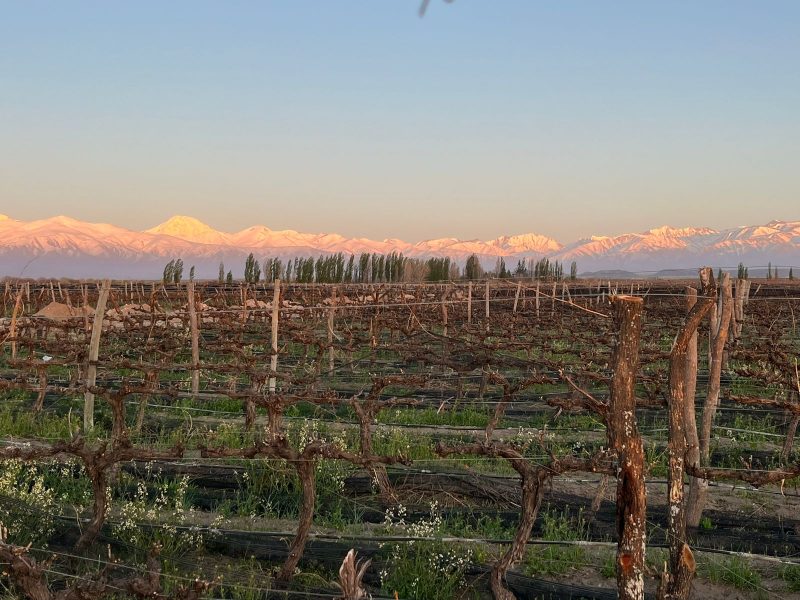
And because we know that without trees there wouldn’t be life on earth, we got the idea for One bottle=One tree. For each bottle we sell, we will finance the costs of developing a native tree: the NGO obtains the seeds and then grows them until the native tree is large enough to be brought to the area that has already been damaged or that is threatened with deforestation; they plant it there so a new tree from a native species will be able to take part in the rehabilitation of the ecosystem. For exports, we work with other international NGOs to offer the same concept to overseas clients.
The trend for sustainable, organic wines is spreading in Europe and the United States. “In Argentina, it began four or five years ago, but it’s headed in the right direction. I see wineries more focused on getting certifications than thinking about their actual impact on the planet and how it can benefit everyone.
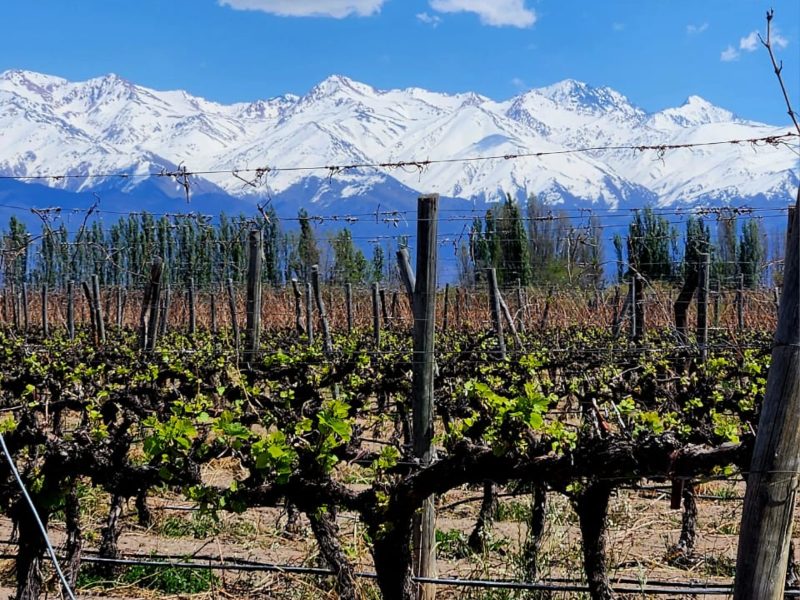
On average, over its lifetime, a tree can compensate for the carbon footprint of over a thousand bottles. It’s a long-term benefit that is of much more value than a certification that only lasts a year. Put another way, you can receive organic (or any other kind of) certification for a year and then go back to traditional viticulture and the planet misses out on the benefits,” says the founder of 3SAPAS.
3 SAPAS: A passion that transcends boundaries
3SAPAS is the result of Arnaud’s passion for Mendoza, which he discovered on an exchange program. He immediately began fantasizing about starting a viticultural business.
He and his brother work with the agricultural engineer and oenologist Luis Coita Civit – who has extensive experience at different wineries – and Fernando Sota, an experienced oenologist. Jonas Lépine, the head of sales and marketing – a similarly seasoned professional – completes the team.
Located on Ruta 89 in Tupungato, Uco Valley (Mendoza), the estate spans 46 hectares in all, of which 35 are under vine. “We’re refurbishing the estate. Apart from the vineyards, the rest is native land that we want to preserve, to avoid monoculture. We’ve planted over five thousand trees, plants and flowers (such as rose and lavender bushes) to get biodiversity into the vineyard and to get the best quality soils possible. We also want to have bees.”
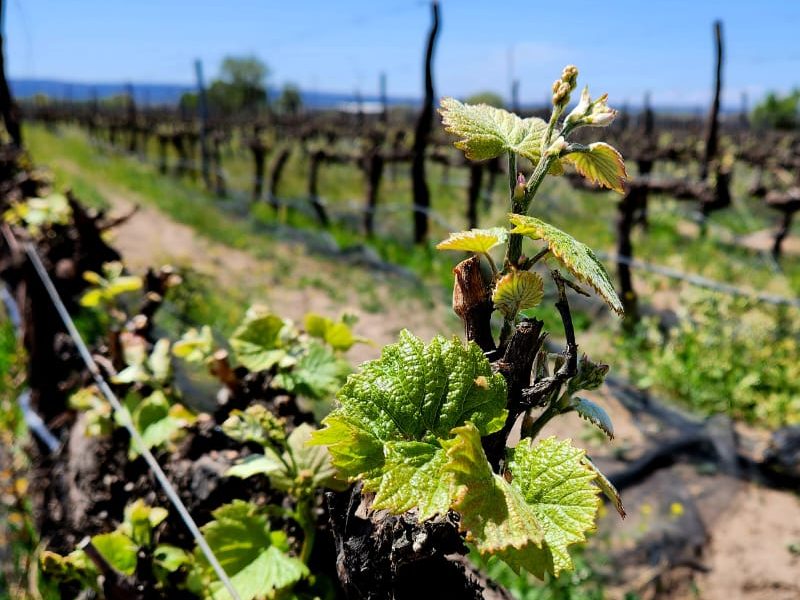
The winery itself is now currently under construction and will produce its own photovoltaic energy to avoid the use of fossil fuels and be completely sustainable. There’ll be an area for visitors featuring a restaurant with an exclusive view of the Andes.
The labels – like everything else at 3SAPAS – also do their part for sustainability, representing the winery’s commitment to the environment. They feature local fauna whose status is currently endangered or threatened: a Flamingo (3SAPAS Malbec 2022 and 3 SAPAS Malbec Reserva 2022, 100% Malbec), a Guanaco (3SAPAS Cabernet Sauvignon 2022 and 3SAPAS Cabernet Sauvignon Reserva 2022, 100% Cabernet Sauvignon), a Puma (3SAPAS Malbec Gran Reserva 2021, 100% Malbec) and an Andean Condor (3SAPAS Blend de finca Incono: Rey del Aire, 65% Malbec, 30% Merlot and 5% Chenin Blanc).
They’ve recently also added two whites to the line, a Sauvignon Blanc 2023 (100% Sauvignon Blanc) and a Viognier 2023 (100% Viognier), as well as a Malbec Rosé 2023 (100% Malbec).
“We are committing to the project and the country long term. As a young company, we are dedicated to generating wealth by preserving our ecosystem because you can’t achieve economic sustainability without acting responsibly towards nature,” say the Swiss winemakers from the foot of the Andes.

